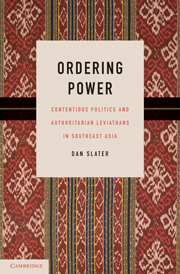Book contents
- Frontmatter
- Contents
- Map, Tables, and Figures
- Acknowledgments
- Map Contemporary Southeast Asia
- Part I The Puzzles and Arguments
- Part II Contentious Politics And The Institutions Of Order
- 3 Colonialism, Cleavages, and the Contours of Contention
- 4 Mobilization and Countermobilization amid Colonial Retreat
- 5 Varieties of Violence in Authoritarian Onset
- Part III The Foundations and Fates of Authoritarian Leviathans
- Part IV Extending the Arguments
- Bibliography
- Index
4 - Mobilization and Countermobilization amid Colonial Retreat
Published online by Cambridge University Press: 05 June 2012
- Frontmatter
- Contents
- Map, Tables, and Figures
- Acknowledgments
- Map Contemporary Southeast Asia
- Part I The Puzzles and Arguments
- Part II Contentious Politics And The Institutions Of Order
- 3 Colonialism, Cleavages, and the Contours of Contention
- 4 Mobilization and Countermobilization amid Colonial Retreat
- 5 Varieties of Violence in Authoritarian Onset
- Part III The Foundations and Fates of Authoritarian Leviathans
- Part IV Extending the Arguments
- Bibliography
- Index
Summary
Introduction
[A]fter Japan's capitulation in August 1945, the Europeans could not make an effective comeback. Nothing like this happened anywhere else in the colonized zones of Asia and Africa. It also meant that Southeast Asia was the one colonized region – after Spanish America 140 or so years earlier – where armed struggle for independence – and more – was commonplace.…No other region of the world – not Latin America, not the Near East, not Africa, and not South Asia – had this kind of alarming profile.
Benedict Anderson“Small” events early on may have a big impact, while “large” events at later stages may be less consequential.
Paul PiersonBetween the end of World War II and the birth of the authoritarian Leviathans that are the core concern of this book, Southeast Asia traversed an extraordinary era of mass political contention. What often appeared to outsiders as a singular, region-wide explosion of armed communism involved subtly distinctive types of contentious politics both across and within Southeast Asia's emerging polities. Anderson's invocation of a uniform “alarming profile” for the region accurately captures a widely held gestalt as World War gave way to Cold War – but it obscures the significant variation in how alarmed different types of Southeast Asian elites in fact were by the different types of conflict reverberating across the region's inchoate political landscapes.
This chapter traces variation in the first postwar wave of contentious politics, from 1945 until roughly the mid-1950s, in Malaya, the Philippines, and Indonesia. As subtle as this variation was, the patterns of elite collective action that arose in response would be strikingly divergent, with profound and lasting consequences for the institutions of political order. In line with Pierson's insight above, minor early differences would mean major differences down the road. Well before a second wave of contentious politics commenced in the mid-1960s, ushering in the demise of pluralist politics and the emergence of new authoritarian Leviathans, these three countries began traveling divergent political pathways: domination in Malaya, fragmentation in the Philippines, and militarization in Indonesia. Stark variation in elite collective action had yielded state, party, and military institutions of widely varying cohesion and capacity by the late 1950s. These institutions would later become the political bedrock of authoritarian Leviathans: regimes bearing the birthmarks of contention, deeply determining their durability during the worldwide wave of democratization to come.
- Type
- Chapter
- Information
- Ordering PowerContentious Politics and Authoritarian Leviathans in Southeast Asia, pp. 73 - 114Publisher: Cambridge University PressPrint publication year: 2010



